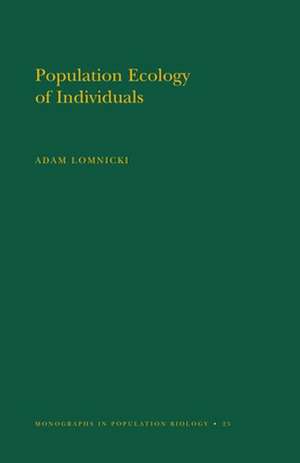Population Ecology of Individuals. (MPB–25), Volume 25: Monographs in Population Biology
Autor Adam Lomnickien Limba Engleză Paperback – 30 iun 1992
Din seria Monographs in Population Biology
-
 Preț: 487.83 lei
Preț: 487.83 lei - 14%
 Preț: 421.28 lei
Preț: 421.28 lei - 23%
 Preț: 726.47 lei
Preț: 726.47 lei -
 Preț: 411.97 lei
Preț: 411.97 lei - 14%
 Preț: 375.32 lei
Preț: 375.32 lei -
 Preț: 320.66 lei
Preț: 320.66 lei -
 Preț: 333.88 lei
Preț: 333.88 lei - 19%
 Preț: 490.34 lei
Preț: 490.34 lei - 19%
 Preț: 490.65 lei
Preț: 490.65 lei - 19%
 Preț: 516.69 lei
Preț: 516.69 lei - 19%
 Preț: 491.13 lei
Preț: 491.13 lei - 19%
 Preț: 487.39 lei
Preț: 487.39 lei - 19%
 Preț: 610.68 lei
Preț: 610.68 lei -
 Preț: 510.10 lei
Preț: 510.10 lei - 19%
 Preț: 522.61 lei
Preț: 522.61 lei - 19%
 Preț: 644.74 lei
Preț: 644.74 lei - 19%
 Preț: 486.11 lei
Preț: 486.11 lei -
 Preț: 369.27 lei
Preț: 369.27 lei -
 Preț: 347.01 lei
Preț: 347.01 lei - 19%
 Preț: 582.28 lei
Preț: 582.28 lei - 19%
 Preț: 498.26 lei
Preț: 498.26 lei -
 Preț: 286.65 lei
Preț: 286.65 lei - 19%
 Preț: 647.52 lei
Preț: 647.52 lei -
 Preț: 471.46 lei
Preț: 471.46 lei - 19%
 Preț: 413.61 lei
Preț: 413.61 lei - 19%
 Preț: 554.34 lei
Preț: 554.34 lei - 19%
 Preț: 486.11 lei
Preț: 486.11 lei - 19%
 Preț: 527.56 lei
Preț: 527.56 lei -
 Preț: 254.59 lei
Preț: 254.59 lei - 19%
 Preț: 485.97 lei
Preț: 485.97 lei - 19%
 Preț: 523.89 lei
Preț: 523.89 lei - 19%
 Preț: 557.48 lei
Preț: 557.48 lei - 19%
 Preț: 488.31 lei
Preț: 488.31 lei - 19%
 Preț: 493.30 lei
Preț: 493.30 lei - 19%
 Preț: 610.20 lei
Preț: 610.20 lei - 19%
 Preț: 553.27 lei
Preț: 553.27 lei -
 Preț: 508.19 lei
Preț: 508.19 lei -
 Preț: 445.87 lei
Preț: 445.87 lei -
 Preț: 475.30 lei
Preț: 475.30 lei - 19%
 Preț: 639.77 lei
Preț: 639.77 lei -
 Preț: 473.57 lei
Preț: 473.57 lei - 19%
 Preț: 585.87 lei
Preț: 585.87 lei - 19%
 Preț: 559.87 lei
Preț: 559.87 lei - 19%
 Preț: 453.94 lei
Preț: 453.94 lei - 19%
 Preț: 430.76 lei
Preț: 430.76 lei -
 Preț: 400.60 lei
Preț: 400.60 lei - 19%
 Preț: 556.68 lei
Preț: 556.68 lei - 19%
 Preț: 454.26 lei
Preț: 454.26 lei
Preț: 515.15 lei
Preț vechi: 635.99 lei
-19% Nou
Puncte Express: 773
Preț estimativ în valută:
98.58€ • 105.41$ • 82.19£
98.58€ • 105.41$ • 82.19£
Carte tipărită la comandă
Livrare economică 17 aprilie-01 mai
Preluare comenzi: 021 569.72.76
Specificații
ISBN-13: 9780691084626
ISBN-10: 0691084629
Pagini: 240
Dimensiuni: 142 x 217 x 15 mm
Greutate: 0.33 kg
Editura: Princeton University Press
Seria Monographs in Population Biology
Locul publicării:Princeton, United States
ISBN-10: 0691084629
Pagini: 240
Dimensiuni: 142 x 217 x 15 mm
Greutate: 0.33 kg
Editura: Princeton University Press
Seria Monographs in Population Biology
Locul publicării:Princeton, United States
Descriere
Shows that the overall dynamical behavior of populations must be understood in terms of the behavior of individuals. The author contends that further progress in population ecology requires taking into account individual differences other than sex, age, and taxonomic affiliation - unequal access to resources, for instance.
